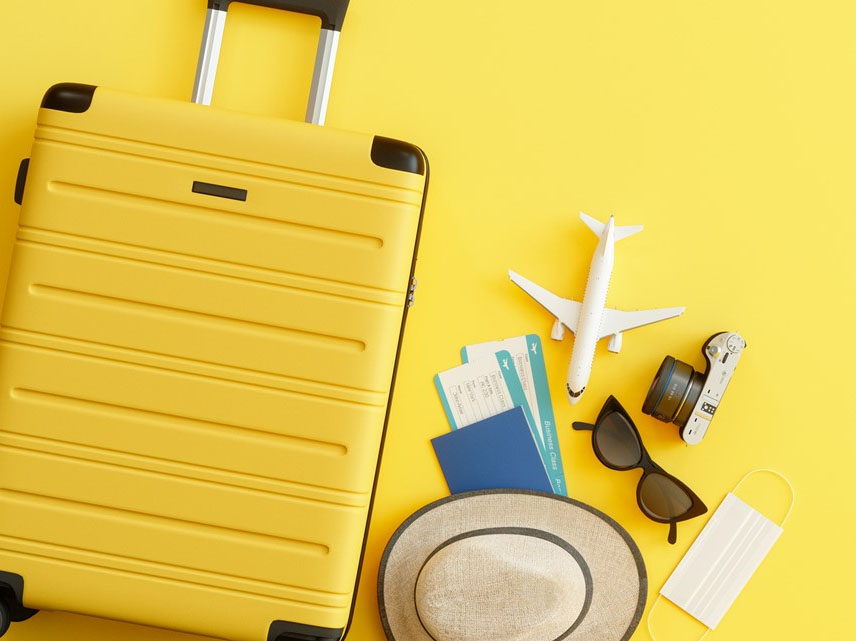5 Essential Tips for Safe Travel
Travelling is one of life’s greatest joys; it opens the mind, introduces us to new cultures, and leaves us with unforgettable memories. However, while the excitement of exploring new destinations is undeniable, it’s just as important to keep safety in mind.

Travelling is one of life’s greatest joys; it opens the mind, introduces us to new cultures, and leaves us with unforgettable memories. However, while the excitement of exploring new destinations is undeniable, it’s just as important to keep safety in mind. With a little preparation and awareness, you can avoid unnecessary risks and ensure your trip is not only enjoyable but also secure.
Here are five essential tips for safe travel – practical, straightforward, and based on real-world experience.
1.Carry a Hook to Secure Your Bag: Stay a Step Ahead of Snatchers
Petty theft, unfortunately, is a common issue in many tourist hotspots. One simple but effective tip is to carry a small hook or carabiner clip to attach your bag to your clothing, such as a belt loop, trouser strap, or even a discreet loop sewn into your clothing. This small action can make a big difference.
Snatch-and-run thefts are often crimes of opportunity. A bag left hanging loosely on a shoulder or placed beside you on a bench or café chair is an easy target. But when it’s physically attached to you, even subtly, it becomes far more difficult to grab quickly without alerting you. It also buys you precious seconds to react if someone attempts a theft.
There are even specialised anti-theft hooks and clips available that are lightweight and travel-friendly. Look for ones that are discreet yet sturdy, and make it part of your daily routine to clip your bag securely when in public spaces.
2.Carry Extra Cash – and in Multiple Currencies
Money issues can quickly turn an adventure into a stressful ordeal. While digital payment systems are widely used in many parts of the world, there are still plenty of places, especially rural areas or local markets, where cash is king.
To be truly prepared, carry a combination of:
- Local currency: For small purchases, transport fares, and places that don’t accept cards.
- Your home currency: Just in case you need to exchange it in an emergency.
- US dollars: Often accepted in countries where their local currency may not be stable or where tourism is a significant part of the economy.
Also, split your cash between different places – some in your wallet, some in your bag, and a bit in a separate secure pouch. If you lose one stash or it’s stolen, you won’t be left stranded. And always avoid carrying large amounts of cash in a single place.
3.Never Rely Solely on Your Phone – Print Important Documents
Modern technology is fantastic, and having your boarding passes, hotel bookings, and maps on your phone is undeniably convenient. However, phones can fail. Batteries die, screens crack, signals disappear, or the phone itself could get lost or stolen.
To avoid being caught off guard, always carry printed copies of essential documents. This includes:
- Your passport ID page
- Travel insurance policy
- Visa documents
- Flight and hotel confirmations
- Any tour or event bookings
- Important addresses (accommodation, consulate, local contacts)
Place these in a waterproof document holder or envelope and keep them in your main travel bag or a secure part of your carry-on. You might never need them, but if you do, they can save you a world of stress.
Keep Family or Friends Updated About Your Location
It’s easy to get caught up in the joy of exploration and forget to check in. But regularly updating someone back home about your whereabouts is a crucial part of safe travel, especially if you’re going solo or visiting less-developed areas.
Before heading out, share a basic travel itinerary with a trusted relative or friend. Include:
- Your flight information
- Accommodation details
- Planned destinations or excursions
- Emergency contact numbers
Then, during your trip, make it a habit to send a quick update every few days – even if it’s just a message to say you’ve arrived safely at your next stop. Should anything go wrong, having someone who knows where you were last and what you were doing can be vital.
Some travellers also use shared location apps (like Find My on iPhone or Google Location Sharing) for added peace of mind, especially for extended trips or adventures in remote areas.
6. Always Carry the Contact Information of Your Embassy
When you’re in a foreign country, especially one where you don’t speak the language fluently, having access to official help can be a lifeline. Your country’s embassy or consulate is there for precisely that reason – to assist you in emergencies, whether it’s a lost passport, legal trouble, natural disaster, or political unrest.
Before your trip, look up the address, phone number, and email of your nearest embassy or consulate. Write it down and keep it with your printed documents. You may also want to save the contact in your phone under a name you’ll easily remember.
In many countries, embassies can provide:
- Emergency travel documents
- Lists of local lawyers or doctors
- Assistance during accidents, arrests, or hospitalisations
- Safety updates and travel advisories
In the unlikely event you face serious trouble abroad, knowing exactly who to call – and how – can make all the difference.
Travel with Confidence and Caution
Travelling safely doesn’t mean travelling fearfully. It’s about being prepared, staying aware, and making informed choices. With these five simple yet powerful tips, you can minimise risk and maximise peace of mind, leaving you free to focus on what matters: enjoying the journey.
- A hook on your bag may seem small, but it adds a layer of protection.
- Multiple forms of currency can prevent a financial hiccup.
- Hard copies of your documents are your backup plan when tech fails.
- Regular check-ins keep you connected and safe.
- And embassy contacts can be your safety net in the most critical moments.
In the end, safe travel isn’t just about avoiding danger, it’s about creating an environment where your adventures can thrive, worry-free.
Bon voyage and stay safe!
Recent Blogs
-

Best Neck and Shoulder Massagers for At-Home Pain Relief
-

Best Collagen Supplements for Women Over 40: How to Elevate Your Choice
-

Best Natural Aphrodisiac Supplements for Boosting Libido and Performance
-

Best Flavored Sunflower Seeds to Satisfy Every Craving
-

Best Brain Health Supplements for Focus, Memory, and Energy